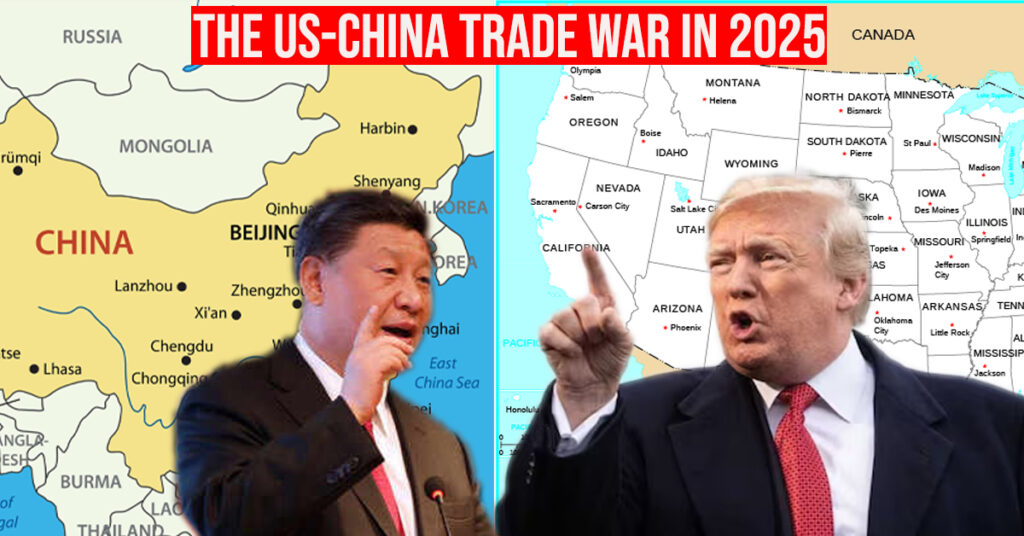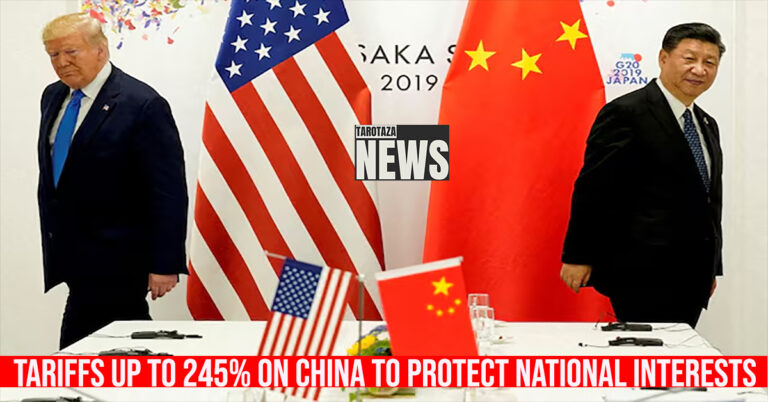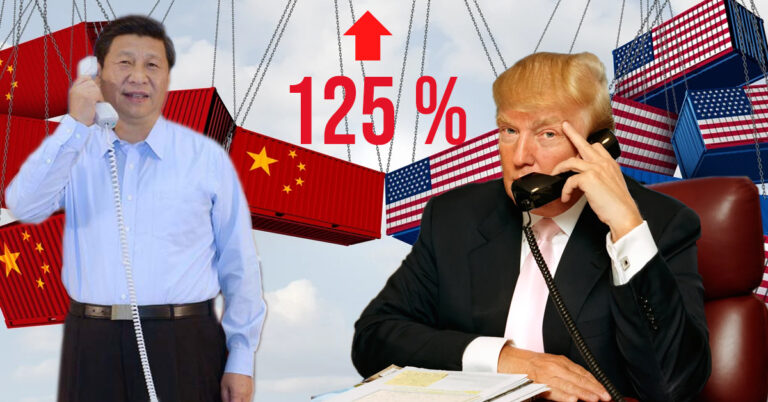
US-China Trade War
Imagine waking up, pouring your coffee, and seeing headlines about tariffs, the US-China Trade War, and crashing markets. That’s the reality for many lately, as the US and China clash in a major economic showdown. As I type this on April 8, 2025, I wonder: how did we get here? And what does this mean for regular folks like you and me?
Let’s explore the messy, fascinating, and deeply human story of the US-China Trade War. This saga is shaking everything—from your next phone’s price to the future of your retirement savings.
US-China Trade War : A Tale of Two Giants: How It All Started
The US and China have been economic powerhouses for decades, but their relationship has always had its ups and downs. Picture two neighbors who borrow each other’s lawnmowers but secretly grumble about who’s got the greener grass. The US and China have been economic powerhouses for decades. But their relationship has always had its ups and downs. Picture two neighbors who borrow each other’s lawnmowers. But they secretly grumble about who’s got the greener grass.

Fast forward to 2025, and Trump’s back in the White House, doubling down on his “America First” playbook. On April 2, he announced a “national emergency” over trade deficits. He rolled out a baseline 10% tariff on all countries. A jaw-dropping 104% levy on Chinese imports starts April 9. My buddy Mike runs a small electronics shop. He texted me that day: “Alex, my supplier just warned me prices are about to skyrocket.” What’s going on?” I didn’t have a great answer then, but I knew this was bigger than just his store.
China didn’t take it lying down. The Chinese foreign ministry vowed to “fight till the end,” promising “necessary measures” to counter Trump’s moves. By April 7, Beijing had increased its tariffs on US goods by 34%.
This pushed the total to a level that’s got economists sweating. It’s like watching two stubborn siblings refuse to back down. Except the stakes are billions of dollars and millions of livelihoods.
US-China Trade War : The Human Cost: Who’s Feeling the Pinch?
Let’s bring this home for a second. My cousin Sarah works at a factory in Ohio that makes car parts. She called me last week, worried sick. “If these tariffs keep going, my boss says we might lose our biggest client in Shanghai. What happens if I’m out of a job?” Her story isn’t unique. American manufacturers relying on Chinese components are scrambling to manage rising costs. This includes auto parts, electronics, and machinery. They’re trying to absorb the costs or find new suppliers. Some might pass the price hikes onto us. That new car you’ve been eyeing could cost a few grand more by summer.
On the flip side, I’ve got a friend, Li Wei, who moved here from Beijing a few years back. He still has family running a clothing business over there. “My parents are freaking out,” he told me over beers last night. “They export to the US, and now they’re looking at a 104% tariff. They might have to shut down.” Small businesses in China, already battered by a slowing economy, are facing a brutal reality. The ones that survive might pivot to other markets, but that’s not an overnight fix.
And it’s not just factories feeling the heat. Farmers in the Midwest, who’ve been shipping soybeans and pork to China for years, are bracing for another blow. Back in 2018, China slashed US agricultural imports during the first trade war. Folks like Tom, a soybean farmer I met at a county fair last year, still haven’t fully recovered. “I thought we were past this,” he sighed when I called him yesterday. “Now I’m wondering if I can keep the farm running.”
US-China Trade War : Markets in Chaos: A Rollercoaster We Can’t Get Off
If you’ve got money in the stock market—or even if you don’t—you’ve probably noticed the wild swings lately. On April 7, global stocks took a nosedive after Trump’s tariff threats sank in. The S&P 500 teetered on the edge of a bear market. Japan’s Nikkei 225 clawed back some losses. That happened after Trump hinted at trade talks with their prime minister. My neighbor, Jen, who’s been saving for her kid’s college fund, texted me in a panic: “Should I pull out? This feels like 2008 all over again!” I told her. I’m no financial wizard, but the uncertainty’s got everyone on edge.

Why the chaos? Well, tariffs mess with supply chains like a kid yanking Lego pieces apart. Companies that rely on cheap Chinese goods—like Walmart or Apple—might see profits shrink, and investors hate that. Meanwhile, oil prices are stuck at multi-year lows as China braces for slower growth. The dollar’s also wobbling against other currencies. It’s a domino effect, and we’re all holding our breath to see where the pieces land.
US-China Trade War : The Political Drama: Trump vs. Beijing
Trump’s playing a high-stakes game of chicken, and he’s not shy about it. On Truth Social, he blasted China for “massive long-term currency manipulation” and “illegal subsidization.” He warned that any retaliation would mean even steeper tariffs. His press secretary, Karoline Leavitt, doubled down, saying, “President Trump has a spine of steel and he will not break.” It’s classic Trump—big promises, bold moves, and a flair for the dramatic.
But China’s not blinking either. Their foreign ministry’s “fight to the end” line isn’t just tough talk.
It’s a signal they’re ready for a long haul. I chatted with a professor friend, Dr. Chen, who studies East Asian politics. “China’s leadership can’t afford to look weak,” she explained. “Backing down now would be a blow to their credibility at home and abroad.” So, while Trump’s betting on economic pressure to force a deal, Beijing’s digging in, betting they can outlast him.

This isn’t just about tariffs, though. It’s personal. Trump’s framed China as the villain stealing American jobs. Chinese officials paint the US as a bully trying to stifle their rise. It’s a narrative clash as much as an economic one.
And it’s got the world picking sides—or trying to stay out of the crossfire.
US-China Trade War : Winners and Losers: Who’s Coming Out on Top?
So, who’s winning this trade war? Honestly, it’s hard to tell. Trump says his tariffs are already working, pointing to countries like Japan and the UK scrambling to negotiate deals. The UK’s chancellor, Rachel Reeves, told Parliament she’s working on a new US trade pact to dodge the fallout. She insisted, “a trade war is in nobody’s interest.” Japan’s Nikkei bounced back after a call between Trump and Prime Minister Shigeru Ishiba.
It hinted at a softer stance for allies who play ball.

But China’s not exactly waving a white flag. Some analysts—like the folks at The Economist—argue Beijing thinks it can win a war of attrition. They’ve got a massive domestic market and a government that can prop up struggling industries. Plus, they’re not above hitting back creatively. Rumors are swirling about a potential ban on Hollywood movies. That move would sting American studios hard.
US-China Trade War : The Ripple Effect: A Global Headache
For the rest of us? It’s a mixed bag. If you’re in Vietnam or Mexico, you might see a boom as companies shift production away from China. My cousin’s friend, who works in logistics, says his firm’s already eyeing new factories in Southeast Asia. But if you’re a consumer like me, hunting for a new laptop, you might be out of luck.
You’re probably looking at higher prices and fewer choices.
This isn’t just a US-China spat—it’s a global mess. Europe’s caught in the middle. Leaders like Ursula von der Leyen are offering tariff cuts to appease Trump while bracing for collateral damage. South African citrus farmers are warning that 35,000 jobs could vanish if US markets tighten up. Even Canada, usually a quiet bystander, is sweating over Trump’s “baseline” tariffs.

I called my old college roommate, Priya, who’s now an economist in London. “It’s like the world’s holding its breath,” she said. “If this escalates, supply chains could freeze, inflation could spike, and we might tip into a recession.” She’s not wrong—experts at the BBC and Bloomberg are tossing around similar warnings. The interconnectedness of our economies means no one’s immune.
US-China Trade War : What’s Next: Deal or Disaster?
Here’s where it gets dicey. Trump hinted that China “wants to make a deal, badly.” However, Beijing’s not picking up the phone—at least not publicly.
His team’s pushing “tailor-made” trade pacts with willing countries, but China’s a different beast. US Trade Representative Jamieson Greer told the Senate on April 8 that some firms rely heavily on Chinese imports.
He warned these firms are in for a rough ride. However, he remains optimistic. He believes other companies will adapt to the changing trade environment.
Meanwhile, folks like Elon Musk are stirring the pot. Word is, Musk made a “personal appeal” to Trump to ease up on the tariffs. He has Tesla plants in China. Despite the appeal, Trump shot him down. Musk later posted a Milton Friedman video on X praising free trade. It was a subtle jab at Trump’s strategy. It’s a reminder that even within Trump’s circle, not everyone’s on board.
For regular people, the future’s murky. Will Sarah keep her factory job? Li Wei’s parents save their business?
Tom’s soybeans find a buyer? I don’t have a crystal ball. But one thing is clear. This trade war is rewriting the rules. And we’re all along for the ride.
https://twitter.com/NxtCypher/status/1909657180929679483
US-China Trade War : A Personal Take: Why It Matters to Us
So, as I wrap this up, I’m left with more questions than answers. Can Trump and China find a way out of this mess? Will the world economy hold steady, or are we in for a rough landing? All I know is, it’s a story worth watching. Not just for the big players, but for all of us trying to understand this unpredictable world.







1 thought on “The US-China Trade War in 2025”